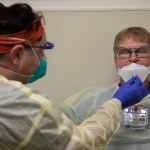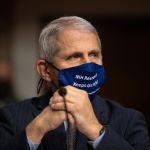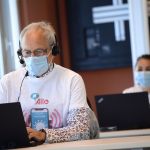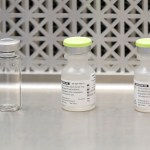Caroline Chen
Have a tip? Send it Here!
Caroline Chen
 I Saw Firsthand What It Takes To Keep COVID Out Of Hong Kong. It Felt Like a Different Planet.
I Saw Firsthand What It Takes To Keep COVID Out Of Hong Kong. It Felt Like a Different Planet.
On a visit to Hong Kong, ProPublica reporter Caroline Chen encountered a 21-day quarantine, a bevy of COVID tests, universal masking and, finally, a fear-free family holiday.
 A Tiny Number Of People Will Be Hospitalized Despite Being Vaccinated. We Have to Learn Why.
A Tiny Number Of People Will Be Hospitalized Despite Being Vaccinated. We Have to Learn Why.
Experts say we should investigate “breakthrough infections” to look out for variants and understand who’s vulnerable. In many cases, that’s not happening. Crucial pieces of the puzzle are being tossed in the trash.
 How Operation Warp Speed Created Vaccination Chaos
How Operation Warp Speed Created Vaccination Chaos
States are struggling to plan their vaccination programs with just one week’s notice for how many doses they’ll receive from the federal government. The incoming Biden administration is deciding what to do with this dysfunctional system.
 Only Seven of Stanford’s First 5,000 Vaccines Were Designated for Medical Residents
Only Seven of Stanford’s First 5,000 Vaccines Were Designated for Medical Residents
Stanford Medicine officials relied on a faulty algorithm to determine who should get vaccinated first, and it prioritized some high-ranking doctors over patient-facing medical residents.
 Most States Aren’t Ready to Distribute the Leading COVID-19 Vaccine
Most States Aren’t Ready to Distribute the Leading COVID-19 Vaccine
A review of state distribution plans reveals that officials don’t know how they’ll deal with the difficult storage and transport requirements of Pfizer’s vaccine, especially in the rural areas currently seeing a spike in infections.
 Who Decides When Vaccine Studies Are Done? Internal Documents Show Fauci Plays a Key Role.
Who Decides When Vaccine Studies Are Done? Internal Documents Show Fauci Plays a Key Role.
Dr. Anthony Fauci will see data from government-funded vaccine trials before the FDA does. One caveat: Pfizer’s study, which is ahead of the others, isn’t included in his purview.
 America Doesn’t Have A Coherent Strategy For Asymptomatic Testing. It Needs One.
America Doesn’t Have A Coherent Strategy For Asymptomatic Testing. It Needs One.
While it battles a virus that can spread quickly via silent carriers, the United States has yet to execute a strategy for testing asymptomatic people.
 ‘Fast-Tracking’ a Coronavirus Vaccine Sounds Great. It’s Not That Simple.
‘Fast-Tracking’ a Coronavirus Vaccine Sounds Great. It’s Not That Simple.
Among the many ways to shorten the vaccine development timeline, approving a treatment based on antibody data — without completing a phase 3 trial — could be contentious. This is why.
 You Don’t Need Invasive Tech for Successful Contact Tracing. Here’s How It Works.
You Don’t Need Invasive Tech for Successful Contact Tracing. Here’s How It Works.
While most discussions have focused on countries’ use of surveillance technology, contact tracing is actually a fairly manual process. After interviewing contact tracing experts and taking an online course, ProPublica health reporter Caroline Chen presents her takeaways.

